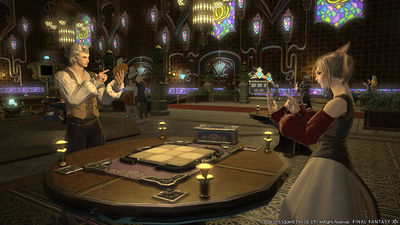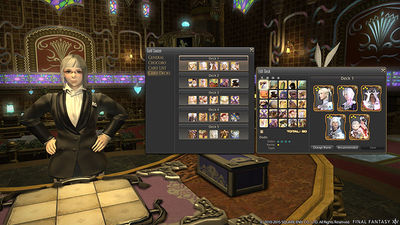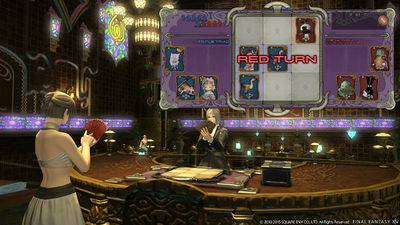Triple Triad
- See also: Triple Triad Cards and Triple Triad NPCs
Triple Triad is a card battle mini-game originally from Final Fantasy VIII. It was released alongside Gold Saucer in patch 2.51. Players can collect Triple Triad Cards from various sources. Winning a Triple Triad match against an Triple Triad NPC will earn the player Manderville Gold Saucer Points and sometimes new cards.
Unlock
Players must complete the level 15 quest Triple Triad Trial. Players can start the quest by talking to Triple Triad Master in Gold Saucer (x4,y7). Players must have completed It Could Happen to You previously.
Cards
In the initial launch of Triple Triad in patch 2.51, 80 cards are available. About half of the cards are obtained from defeating Triple Triad NPCs. The other half can be purchased with Manderville Gold Saucer Points, rewarded from Triple Triad Tournaments, obtained randomly from card packs and dropped from dungeons, trials and other duties.
After obtaining a new card, you can permanently add it to your card list. If you obtain a card that you already have, you can sell it for MGP by talking to Triple Triad NPC in the Gold Saucer (x4,y7). Note that you cannot trade the cards or sell them for gil.
How to Obtain Cards
- Duel and win against NPCs.
- Purchase with Manderville Gold Saucer points.
Card Use Restrictions
Cards have 5 rarities: common (★), uncommon (★★), rare (★★★), epic (★★★★) and legendary (★★★★★).
Initially you can only have 1 uncommon or higher card in your deck. When you have collected 30 to 59 cards, you can have as many common or uncommon cards in your deck but only 1 rare or higher card. When you have 60 or more cards, you can have as many rare or lower cards but only 1 epic or legendary card.
Build a Deck
You can create 5 pre-made decks. Each deck contains 5 cards. You can build decks by going to the Gold Saucer Menu then the Card Decks sub-menu.
Card Types
Cards have types noted on upper right corner. Card types come into play during certain rules.
Card Types are: Primal, Beastman, Scions and Garland.
How to Play
Challenge NPCs
Players can challenge certain NPCs to Triple Triad matches. These NPCs are found not only in Gold Saucer but also all over Eorzea. Some of these NPCs will have icons over their heads indicating you can challenge them to Triple Triad matches. You must pay MPG to play against these NPCs. When you win against an NPC, you are rewarded with MGP and get new cards. Different NPCs reward different cards.
Challenge Players
Players can not only challenge NPCs but also other players. When playing against other players, you can set whatever special rules you want. It does not cost any MGP to challenge other players. You do not win or lose cards when you play against other players. You will earn MGP when you win and very amount of MGP when you lose.
- First 5 matches of the day earns you additional MGPs. It resets on 7AM PST / 10AM EST / 3PM GMT.
Players can only challenge other players to Triple Triad in certain areas:
- The Manderville Gold Saucer
- Limsa Lominsa Upper Decks, Adventurer's Guild (x11,y11)
- New Gridania, Adventurer’s Guild (x11,y13)
- Ul'dah - Steps of Nald, Adventurer's Guild (x11,y9)
- Eastern La Noscea, Costa de Sol (x33,y31)
- South Shroud, Buscarron's Druthers (x17,y19)
- Central Thanalan, The Coffer & Coffin (x19,y20)
- Coerthas, The Observatorium (x26,y28)
- Mor Dhona, Seventh Heaven (x21,y8)
Rules
Basic Rules
Triple Triad is played on a 3 by 3 grid, totaling 9 spaces.
Each game, each player will use a deck of 5 cards.
Each card has 4 numbers, arranged in a north-south-east-west position.
Each number corresponds to the strength of that side of card.
Players take turns placing cards. Each player can 1 card on any of the empty spaces.
Player who goes first is declared at random.
When a card is placed on the board next to an opponent's card, if the number of your card's side that is facing your opponent is greater than the number of your opponent's card's side that is facing your card, you take over your opponent's card.
After all 9 spaces have been filled, the winner is the player who controls more cards. Note that the unplayed 10th card is also counted.
Special Rules
In addition to Basic Rules, special rules alter the way the game is played. NPCs in different regions have different regional rules that reset 7AM PST / 10AM EST everyday. Up to 2 special rules are applied to the NPCs of a region. Note that certain NPCs are immune to regional rules. Match rules are special rules that only apply to a match. Each match rule consist of up to 2 special rules. NPCs set their own match rules. When challenging another player, you can set your own match rules. Additionally, Regional rules are also applied when playing against other players. So up to 4 special rules can affect the game in a PvP match.
All Open
A rule wherein all five cards in each deck are made visible to both players.
Three Open
A rule wherein three random cards in each deck are made visible to both players.
Same
A rule that adds a new condition to the capture mechanic. If the numbers of two or more cards are the same as the numbers on the adjacent sides of the card you place, you gain control of every matching card. Those 2 or more cards can be your cards or your opponent's cards. For example if your card has "3" on left and bottom of your card, your opponent has 2 cards to your left and bottom, both with the numbers "3" facing your card. You capture both of those cards.
This rule also allows you to score a "Combo" capture. Should the cards you capture lie adjacent to "weaker" cards (i.e. cards with smaller numbers on the neighboring sides), those cards will fall under your control as well. Only one of the two or more matching cards needs to belong to your opponent for the Same capture mechanic to take effect.
Sudden Death
When "Sudden Death" is in effect, any match that ends in a draw will be restarted from turn one. Your deck for this new match will consist of the cards you had control over at the end of the previous game. Sudden Death will continue until one player wins or until five more consecutive drawn matches have been played, at which point the game will result in a draw.
Plus
rule that adds a new condition to the capture mechanic. It is kinda similar to Same rule. If the numbers of two or more cards have the same total when added to the numbers on the adjacent sides of the card you place, you gain control of every matching card. For example if the card you place has 3 on top and 2 on left and your opponent's cards to the top and left has 4 and 5 respectively, you capture those 2 cards. It is because 3 + 4 = 5 + 2. Similar to Same, Plus works with your cards and your opponent's cards.
This rule also allows you to score a "Combo" capture. Should the cards you capture lie adjacent to "weaker" cards (i.e. cards with smaller numbers on the neighboring sides), those cards will fall under your control as well. Only one of the two or more matching cards needs to belong to your opponent for the Plus capture mechanic to take effect.
Random
A rule wherein your chosen deck will be replaced with five cards selected at random from your entire card list.
Order
A rule wherein you are required to play each card in the order that it appears in your deck.
Chaos
A rule wherein the card you play each turn is selected at random from your deck.
Reverse
A rule wherein the conditions for capturing cards are switched so that smaller numbers are more powerful than larger numbers.
Fallen Ace
A rule wherein the all-powerful "A" becomes susceptible to capture by the lowly "1." If the Reverse rule is also in play, a "1" will then become vulnerable to capture by an "A."
Ascension
A rule that affects cards that are grouped into a specific type, such as "Primal" or "Beastman." When placed on the playing grid, the number values on these cards are increased by one for every card of that type that is in play. Numbers that are increased to "11" or more are considered to be of "A" rank.
Descension
A rule that affects cards that are grouped into a specific type, such as "Primal" or "Beastman." When placed on the playing grid, the number values on these cards are decreased by one for every card of that type that is in play. Any number that is decreased to "0" or less is treated as a "1."
Swap
A rule wherein one card from your deck is switched with one of your opponent's before the match begins. The cards to be swapped are chosen at random, and are returned to their original owners at the end of the game.
Roulette
When the "Roulette" rule is in effect, the advanced rules for the match will be chosen at random.
Combo
Combo is only available during Same and Plus rules. When you capture cards with Same or Plus rules, if opponents' cards adjacent to the newly captured cards are weaker. Those cards are captured too. If those cards are next to more weaker cards, those cards are captured too. Combo can flip the whole board.
Tournaments
Players can compete against some of the best Triad Triple players to win some of the rarest cards.
Participating in Tournaments:
Players can sign up to participate in ongoing tournaments by speaking with the Tournament Recordkeeper NPC at the Card Square in the Manderville Gold Saucer (x4,y7). It should also be noted that, in addition to players, NPCs located within the Card Square can also participate in tournaments.
- Players must first complete a tutorial match with the Triple Triad Master before participating in any tournaments.
Tournament Rules:
Tournament participants can only play a set number of matches per tournament, with every match played counting toward their final scores. This score will increase for every match won, with more points being awarded for defeating higher-ranked opponents. Each tournament has a fixed set of special rules that tournament matches must follow. This does not apply to regional rules.
Tournament Rankings:
Players can view the standings for ongoing tournaments at any time by either speaking with the Tournament Recordkeeper NPC at the Card Square in the Manderville Gold Saucer (x4,y7), or examining the nearby Tournament Ranking Board. Scores will be locked the moment the tournament ends, and these numbers will determine the final rankings.
When two or more players share the same score at the end of a tournament, rank is then determined by the greatest number of wins. If wins are also equal, then rank will be decided by the least number of matches played. Should match numbers also be equal, then the higher rank will go to the participant who first recorded a result on the tournament ranking board.


